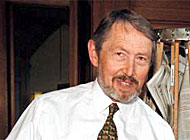Analysts urge caution in seeking alternative to Taliban

The West should be extremely wary in choosing a regime to replace the ruling Taliban in Afghanistan, if the Taliban should crumble as a result of US strikes, says Kurt Spillmann, a security and conflict analyst at the Federal Institute of Technology in Zurich. He also says the West should not place undue faith in the opposition force, the Northern Alliance.
“If the Northern Alliance gets enough support, they might be able to take over from the Taliban and be successful in the political struggle,” says Spillmann. “But remember that when they were in control of Kabul in the nineties, it wasn’t a very pleasant time for the people of the Kabul at all.”
He warns that Afghanistan’s political landscape would be “devastated” and “extremely unpleasant”, if the Northern Alliance were to take control.
Spillmann says it’s of primary importance for the broad international community backing the strikes to unite to rebuild Afghanistan.
“Last time, when the Russians were forced out, Afghanistan was left to itself with the result that it is still as devastated now as it was 10 years ago,” says Spillmann.
One important part of this rebuilding exercise would be to motivate the “Afghan elite” who fled the country in the past decades to return and “rebuild their lives and their country.”
Bin Laden’s following
The rising popularity of Osama bin Laden in Islamic countries also poses a serious threat to Westerners hoping to impose a new regime in Afghanistan, says Reinhard Schulze, Director of Islamic Sciences at Bern University. Bin Laden has become a “hero”, particularly in the non-Arab Islamic world, such as in Pakistan, India and Indonesia.
“The US assaults have helped bin Laden, as he is now seen as the true defender of the Islamic cause,” says Schulze. “Some people in the Islamic world now regard bin Laden as a victim of the west. They see a new general opposition to the Islamic world on the one hand and western powers on the other.”
Spillmann echoes this view: “You see rising waves of sympathy among the masses for bin Laden – they look to him as a symbol of their interests, fighting the big enemy, which is American and Western interests.”
Schulze also points to bin Laden’s manipulation of Islamic rhetoric for political ends. “He uses Islamic words in a political way, especially such words as unbelievers and jihad,” he says. “But unlike the Taliban, he doesn’t argue in theological terms. His language and symbols are chosen for a political and not a religious end.”
West faces invisible enemy
Schulzer says that although bin Laden’s hold on Arab countries is not so strong – he is often seen a man intend on “building a reactionary Islamic world” – he still has old allies within smaller Islamic movements, notably in Egypt and Algeria, from the time of the Afghani war in the 1980s.
Western forces should be extremely wary of sending ground troops in Afghanistan, says Spillman, as they might relive the experiences of Russian troops in the country.
“We know from the time the Russians were in Afghanistan, from 1979 to 1989, that they had a very hard time locating the enemy,” says Spillman. “I’m afraid (that sending ground troops) will be an extremely difficult task.”
Muslims in Switzerland respond
Muslims in Geneva, meanwhile, have denounced the air strikes, saying that they would lead to a radicalisation and extension of terrorism among the “oppressed” Muslim populations of the world.
Hafid Quadiri, spokesman for the mosque in Geneva, observed that although the air strikes occurred at the same time as a humanitarian mission delivering food to the Afghans, “the bomb alwars arrives before the sack of flour.” He said the bombing should stop.
“There are other ways of resolving the problem of terrorism,” said Quadiri.
There are about 250,000 Muslims in Switzerland. Some 15,000 of them, representing about 100 different nationalities, live in Geneva.
by Scott Capper and Vanessa Mock

In compliance with the JTI standards
More: SWI swissinfo.ch certified by the Journalism Trust Initiative
You can find an overview of ongoing debates with our journalists here. Please join us!
If you want to start a conversation about a topic raised in this article or want to report factual errors, email us at english@swissinfo.ch.